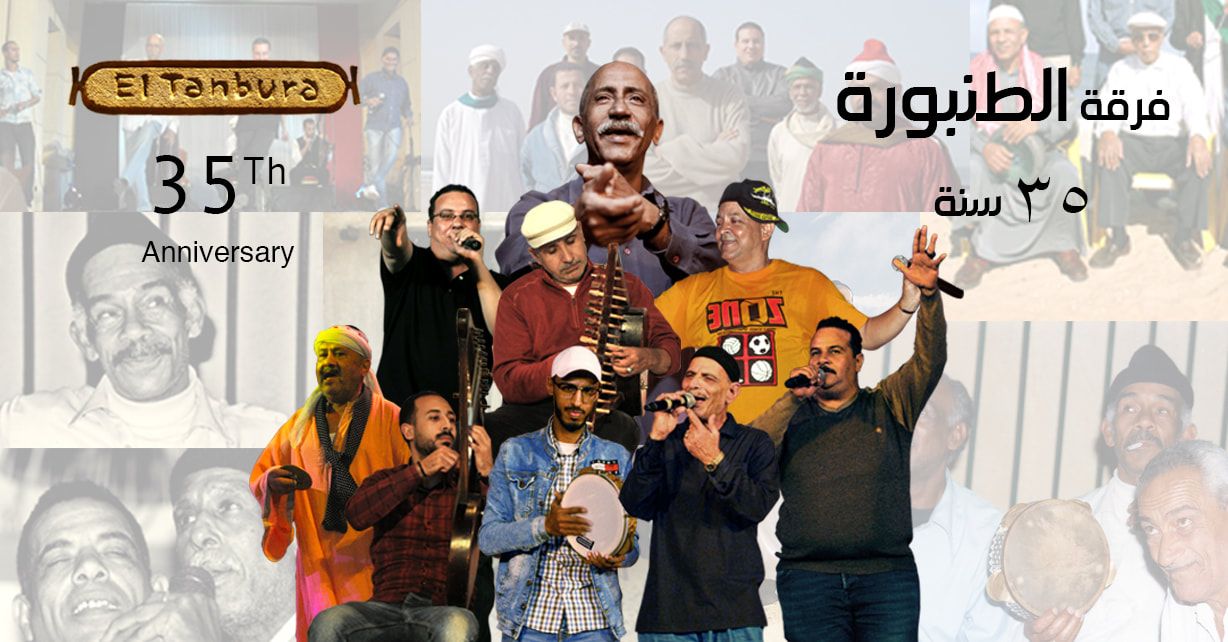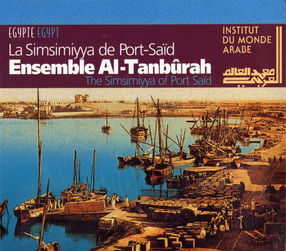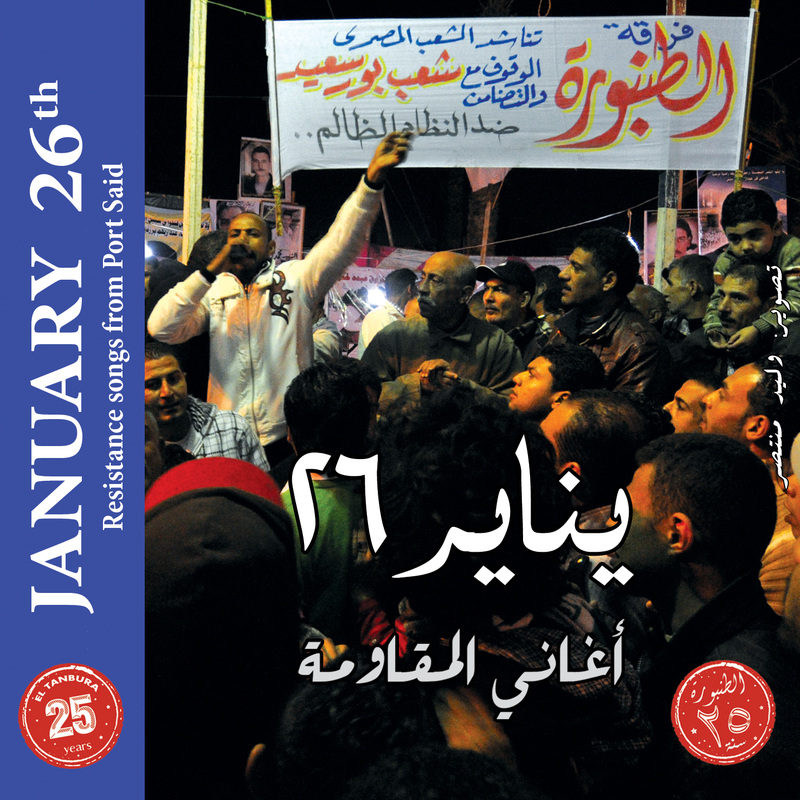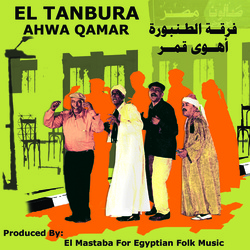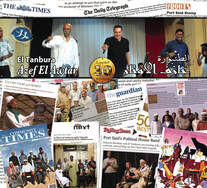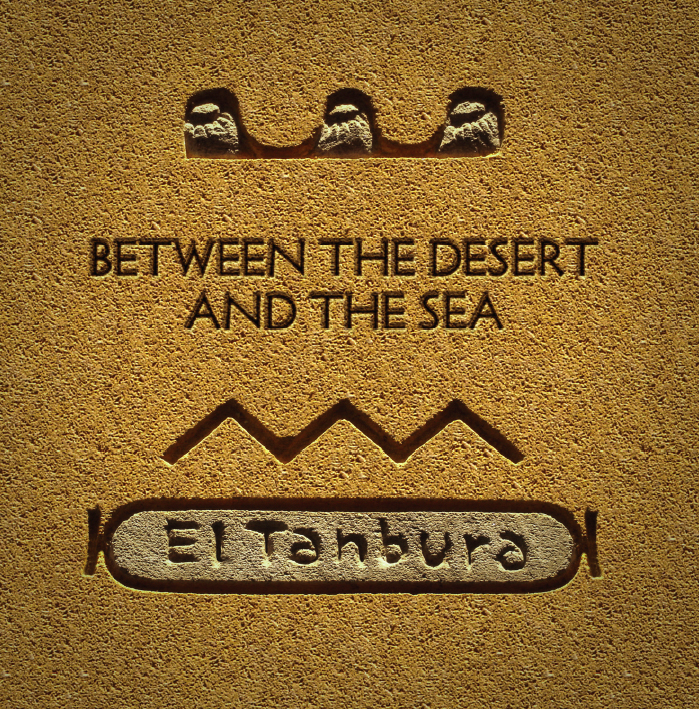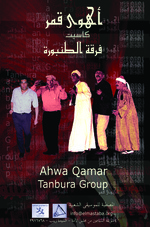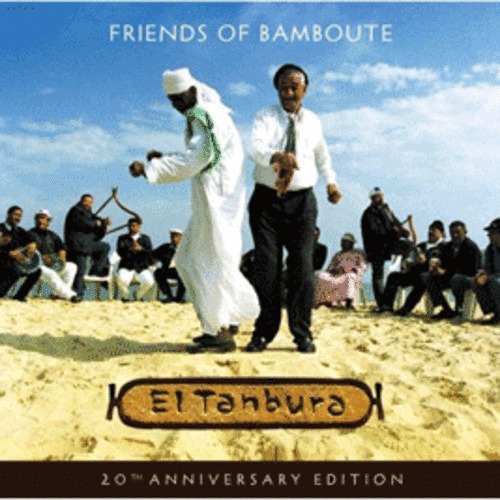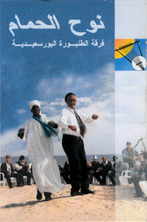El Tanbura
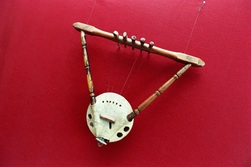 Simsimiya Instrument Simsimiya Instrument
El Tanbura is a collective of veteran Egyptian master musicians, singers, fishermen and philosophers based in Port Said. For almost two decades they have been the custodians of some of Egypt's oldest folk melodies in Port Said, the Mediterranean gateway to the Suez Canal.
No one knows the exact origins of the simsimiyya, a smal lyre. One Egyptian legend tells how the first instrument was fashioned from the shell of an unfortunate turtle that had ventured too far along the Nile and ended up as dinner for a hungry musician. There is evidence that the simsimiyya has existed for centuries in the Arabian Gulf and along East Africa. Her music (the lyre is always referred to as feminine and her players as lovers) is said to have the ability to calm the waters of the Red Sea. Another folk tale attributes her origins to a mysterious, enchanting Siren who slowly seduces both the lover and the audience with mesmerizing melodies derived from ancient exorcism rituals. 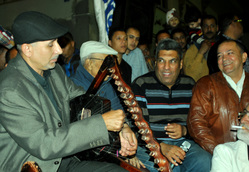 El Tanbura perform in Sham El Nesim street festival 2014 - Port Said El Tanbura perform in Sham El Nesim street festival 2014 - Port Said
We do know that the instrument only arrived in Port Said during the 1930s, much to the frustration of the local suhbagiyya (musicians) who had previously enjoyed the undivided attention of local audiences with damma songs - a fusion of Sufi inspired vocal chants and frenzied drumming.
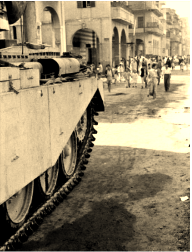
It was only after the Suez Crisis of 1956 that damma and simsimiyya musicians embraced both repertoires. The War drew the former rivaling musicians together, as the simsimiyya provided a voice for the resistance movement through protest songs; a tradition that continued in the subsequent War of 1967 and exile of the people of Port Said during the Israeli occupation of Sinai. In exile, the diaspora communities would gather and sing the old songs reminding them of home.
|
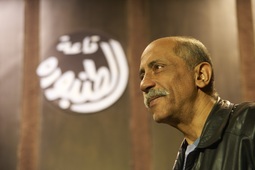 Zakaria Ibrahim Zakaria Ibrahim
Zakaria Ibrahim, El Tanbura's founder, first heard the suhbagiyya in Port Said as a young boy in the 1950s. The music he heard as a child haunted him all of his adult life. As a youngster, he during his exile from the Canal Zone, a long with his compatriots, and experienced the major role that this music played in keeping up a spirit of resistance, hope and cultural identity. When he finally returned to Port Said in 1980, he was saddened to see that this music had been overtaken by commercial band and was almost extinct. Zakaria spent nine years seeking out the old masters and building friendships, trying to convince the musicians to perform once again... and El Tanboura group was born on December 1988.
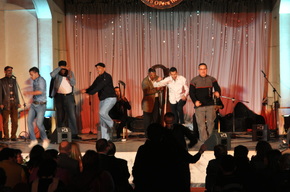 El Tanbura's 25th Anniversary @ Opera House El Tanbura's 25th Anniversary @ Opera House
At first, news of the group's rehearsals drew scorn and ridicule from the commercial musicians; however the infectious atmosphere of the initial performances convinced others with an interest in Sufi philosophy and the pre-War traditions of Port Said to join the floating collective of El Tanbura's members.
Over time, the band grew to include not only folk musicians and percussionists, but dancers and singers drawn from local fishermen, market traders and builders, alongside the unlikely addition of master instrumentalists from some of the State-approved music troupes who were desperate to perform with others who had a vibrancy of spirit and to play long-forgotten songs from the past ,- praising something other than the government -approved subjects Band members dress in an eclectic mix of gallabiyyas, jeans, sunglasses, fez and Nike caps. Their music is driven by the seductive call of the simsimiyya. They perform regularly in Port Said and at El Damma Theatre in downtown Cairo. Upcoming Tanbura Concerts |
El Tanbura's Discography
On-line store:
On-line Movie:
|
|
El Tanbura Capturing a Vanishing Spirit
Genre: Documentary Production Company Philippe L.Dib (Egypt) Co-Production Company: El Mastaba Center Producer: Philippe Dib Associated Producer: Zakaria Ibrahim Recorded: 2006 Duration: 51 min Director: Philippe Dib Camera: Claude Stemmelin, Karim Al Hakim Editor: Mamdouh ElKady Author: Philippe Dib |
Zakaria Ibrahim, director of El-Tanbura, recounts his journey towards the resurrection, re-formation and subsequent revival of the musical tradition of the simsimiya, El-Dama and El-Haz in Port-Said. Within the context of exile, urban uprooting, cultural amnesia in post-revolutionary Egypt, Zakaria and members of El Tanbura troupe narrate their journeys towards the conservation of Egyptian folklore. El-Tanbura, a sonic voyage across the cultural heritage of Port-Said, offers a unique vista towards Egyptian modern history and the understanding of music as a form of political resistance, by way of trance-like sound escapes and gatherings, and the veneration of the human spirit.
On-line Music Videos:
|
|
|
|
Produced Albums for El Tanbura:
|
La Simsimiyya de Port-Said
Format: CD, Album Country: France Released: 1999 Copyright (c): Institut Du Monde Arabe Distributed By: Harmonia Mundi Distribution January 26th
Format: CD, Album Country: Egypt Released: 2013 Copyright (c): El Mastaba Center Distributed By: El Mastaba Center |
Ahwa Qamar
Format: CD, Album Country: Egypt Released: 2006 Copyright (c): El Mastaba Center Distributed By: El Mastaba Center Azef El Awtar
Format: CD, Album Country: Egypt Released: 2018 Copyright (c): El Mastaba Center Distributed By: El Mastaba Center |
Between the desert and the sea
Format: CD, Album Country: UK - Egypt Released: 2006 Copyright (c): 30IPS Ltd / El Mastaba Centre Distributed By: World Village / El Mastaba Center Ahwa Qamar
Format: Cassette, Album Country: Egypt Released: 2003 Copyright (c): El Mastaba Center Distributed By: El Mastaba Center |
Friends of bambouty
Format: CD, Album Country: UK - Egypt Released: 2009 Copyright (c): 30IPS Ltd / El Mastaba Centre Distributed By: Proper Music Distribution / El Mastaba Center Noh El Hamam
Format: Cassette, Album Country: Egypt Released: 2002 Copyright (c): El Mastaba Center Distributed By: El Mastaba Center |
Festivals the band has participated in:
|
1996, France: Institute Du Monde Arabe, “Egypt Lights” week in Paris.
1997, Jordon, spring Amman independent bands festival 1997, Jordon, summer, international Jerash Festival 1997, autumn, Italy, World Music Festival in Florance. 2000, Canada: international Song and music festival in Marvel, and won the 1st prize. 2001, France, Ramadan Festival, Egyptian culture center in Egypt. 2001, Sweden, re:orient festival in Stockholm 2002, France, Institute Du Monde Arabe an Montpellier Festival 2002, England, Shetat festival in the music village, London. 2002, Mali, Bamako traditional arts festival 2003 Switzerland, lucerne Festival in Lucerne, Switzerland. 2003, Lebanon, Beirut Street bands Festival 2005. Tanzania, Sauti za Busara Festival, Zanzibar. |
2006, Holland and Belgium, "Mundial festival”
2006, Engiland, southbank festival 2006 Spain, Womex Festival 2007, Engiland, Womad UK festival 2007, Eniland. Lamer Tree Festival 2009, Eglinad, Platt Fields Park festival, Manchester. 2010, UAE, WOMAD Abu Dhabi Festival. 2010, France, Eurockéennes festival. 2012, France, Generiq Festival, Dijon 2012, France, Africolour Festival. 2013, Tunisia, the social movement for mobilize to the next World Social Forum 2013, Russia, WOMAD Russia Festival. 2014, Egypt, WANAS Festival |

